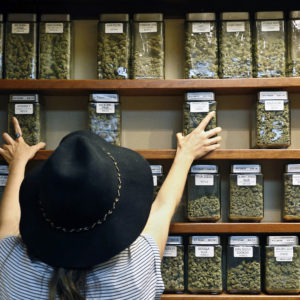91 Americans die every day from an opioid overdose, with deaths from prescription opioids having more than quadrupled since 1999, according to the Centers for Disease Control and Prevention – but what if marijuana, historically considered a “gateway drug” could actually reduce opioid deaths? Research published earlier this month in the American Journal of Public Health found that Colorado’s legalization of recreational marijuana in 2014 coincided with a 6.5 percent reduction in opioid overdose deaths.
Furthermore, studies in the Journal of the American Medical Association and in the Journal of Drug and Alcohol Dependence found that opioid-induced hospitalization and deaths were significantly lower in states with medical marijuana programs than states without medical cannabis laws.
However, all these studies suggested that further future investigation is needed to confirm whether a causal relationship exists between marijuana legalization and a decrease in opioid related deaths.
The Colorado paper’s authors stop short of openly saying that legalization caused the opioid death reversal. Rather, they said that legalization was “associated” with a decline in opioid deaths. The authors also warn that their study looks only at a small timeline because legalization is still relatively new.
“These initial results clearly show that continuing research is warranted as data become available, involving longer follow-ups and additional states that have legalized recreational cannabis,” the study’s authors wrote.
Currently eight states and the District of Columbia have legalized recreational marijuana sales, but medical marijuana is legal in 28 states and D.C.
Drug overdose deaths and opioid-related deaths continue to increase in the U.S. and this has led President Donald Trump’s administration to declare it a national public health emergency.
However President Trump’s Attorney General, Jeff Sessions isn’t quite convinced about marijuana’s positive impacts on the opioid epidemic. He has in the past compared marijuana to opioids themselves and implied the notion that medical marijuana could help some addicts recover is “stupid.”
“I’ve heard people say we could solve our heroin problem with marijuana, How stupid is that? Give me a break! Medical marijuana has been hyped, maybe too much,” Sessions said as he addressed law enforcement officials in Richmond earlier this year, according to the Washington Post.
Earlier this year, in June, Sessions sent a letter to lawmakers asking them to include language in the new budget that says marijuana can lead to “significant negative health effects.”
U.S. Senator Michael Bennet, D-Colo., has questioned the Trump administration’s hostility to state policies regarding legal marijuana.
In May, Bennet and a group of senators sent the Office of National Drug Control Policy a letter suggesting they target deadly drugs, like opioids, rather than marijuana, which they suggested is not as deadly and dangerous as opioids.
The reason some are hopeful about marijuana’s role within opioid deaths is that some patients require fewer opioids to treat their pain when they have access to marijuana. Colorado’s data reflects the impact of recreational marijuana access in particular, not medicinal marijuana. This latest study suggests the possibility that people seeking to get “high” on mind-altering drugs, like oxycodone, hydrocodone, and methadone, when given the opportunity, tend to choose a safer option. The safer option being marijuana, when it’s legal and available from sources other than black market drug dealers.
There might even be a biological underpinning to the Colorado findings. Research published in 2013 in the journal Addiction Biology suggests that cannabis “interferes with brain reward mechanisms responsible for the expression of the acute rewarding properties of opioids…”
These studies all suggest that marijuana availability is associated with a decrease in opioid use, abuse, and overdose which flies in the face of opponents of marijuana legalization, who have claimed for years that marijuana is a dangerous “gateway drug.” Marijuana opponents claim that it leads users to more dangerous and addictive drugs, like heroin or cocaine. These arguments are usually based on the foundational fact that most users of heroin, cocaine, and other dangerous drugs also report that they use marijuana. However the same drug users report using tobacco and alcohol as well.
Critics of the marijuana gateway theory like to point out that correlation is not the same as causation in regards to marijuana usage and its connection to other more harmful drug usage. These latest studies on marijuana suggest the correlation appears to be reversed, although again causation hasn’t been proven yet.
“Now there’s evidence of a negative correlation between marijuana and harder drugs. More marijuana correlates with less opioids. Rather than a gateway, marijuana may be an off-ramp to opioid abuse. Opponents of marijuana legalization should keep that in mind before they try to close this ramp off,” Jeffrey Singer a surgeon in Phoenix and a Senior Fellow at the Cato Institute said in an article earlier this month.

